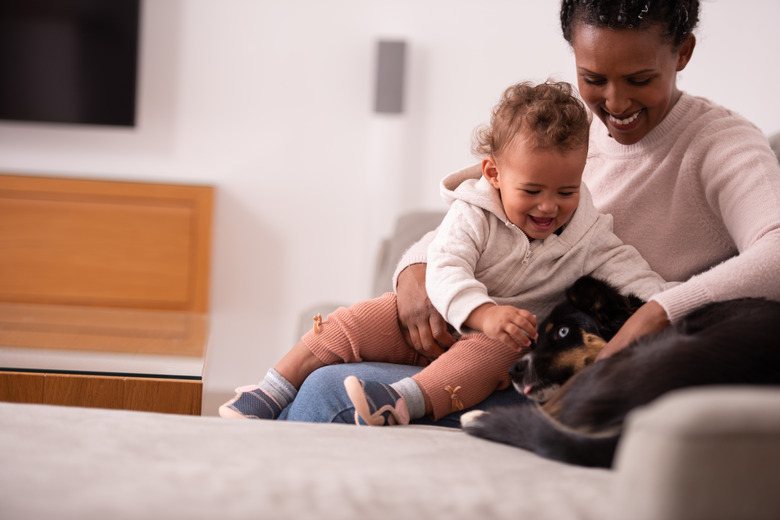What To Do If The Dog Growls At A New Baby
Dog breeds that love babies are the ideal choice for a growing family, and certainly every type of canine can fit this bill, but a dog growling at a newborn baby is definitely alarming, as it means there's a conflict brewing related to fear, stress, or anxiety on the part of your dog. Having a baby is a joyful event, though if you're a dog owner, this moment requires some preparation and careful supervision.
Why a dog growls at a baby
Why a dog growls at a baby
A dog growling at a newborn is the result of a big change in your pet's routine, and snarling or even nipping your baby is his way of showing stress. Even if you feel you've trained your animal well around people and in new situations, any type of dog, whether large or small, old or young, can react badly at the prospect of a wailing, wiggly new baby. Know that because your dog's instinctive predatory drive can rear its head at any moment, your pet could snap.
Before the baby arrives
Before the baby arrives
A new baby is in the works for nine months, of course, and adoptions can take even longer. This means you have plenty of time to get ready for this big change in your dog's life.
- Train, train, train: If you've been lax with your pet's obedience training, ramp it up now. Staying, sitting, and no jumping are critical skills your pup should learn before the baby is born. You can even practice your dog's tricks while holding a doll so he's used to seeing you this way.
- Visit the nursery: As you set up the baby's room, allow your canine pal to enter it and have a look around and a good sniff. It's smart to let your pet become used to this new space and even play in it with you so he's comfortable.
- Add gates: Cordon off certain areas where you don't want your dog and baby to mix and shut doors if necessary. You should also have a safe spot (like his crate or bed) to which your dog can retreat when he's tired or needs a break from the new baby.
- Introduce sounds: Babies are loud. Crying, babbling, and all those infant toys that beep and boop may cause your dog to whine or hide under the couch. Before you have your baby on board, play these sounds via video or audio file so your pup has a chance to acclimate.
- Introduce smells: Take advantage of your dog's excellent sniffer and offer him a chance to smell your baby's clothing, lotion, and diaper cream. When he carefully investigates it, hand over a favorite tasty treat as a reward, and he'll soon associate your baby's odors with positive feelings.
Watch your dog carefully
Watch your dog carefully
There are several signs you might notice before your dog growls at the baby. Be vigilant about these and always sit closely when your baby and dog are in the same room. Indications that your dog is upset include lip licking, yawning, turning her head away, and laying her ears back close to her head. Don't be fooled by a dog who wants to lick your baby, as this practice doesn't mean affection and isn't a form of kissing. In fact, sniffing, licking, and other oral explorations of your child are signs that your dog is worried about the baby in front of her.
Don't force it
Don't force it
The truth is that your dog may never love your baby, so don't take it personally if aloof behavior from your canine ends up being the norm. Keep in mind that you shouldn't insist or force your dog to interact with your newborn. If he seems stressed or can't settle down around your newborn, send him to his safe spot (the crate or his bed) with a chew toy.
If you can't seem to control a dog who growls at your baby or your pup's aggression isn't subsiding, consider getting some professional help. A certified applied animal behaviorist or dog trainer can work with you and your pet and help you keep the peace at home.
